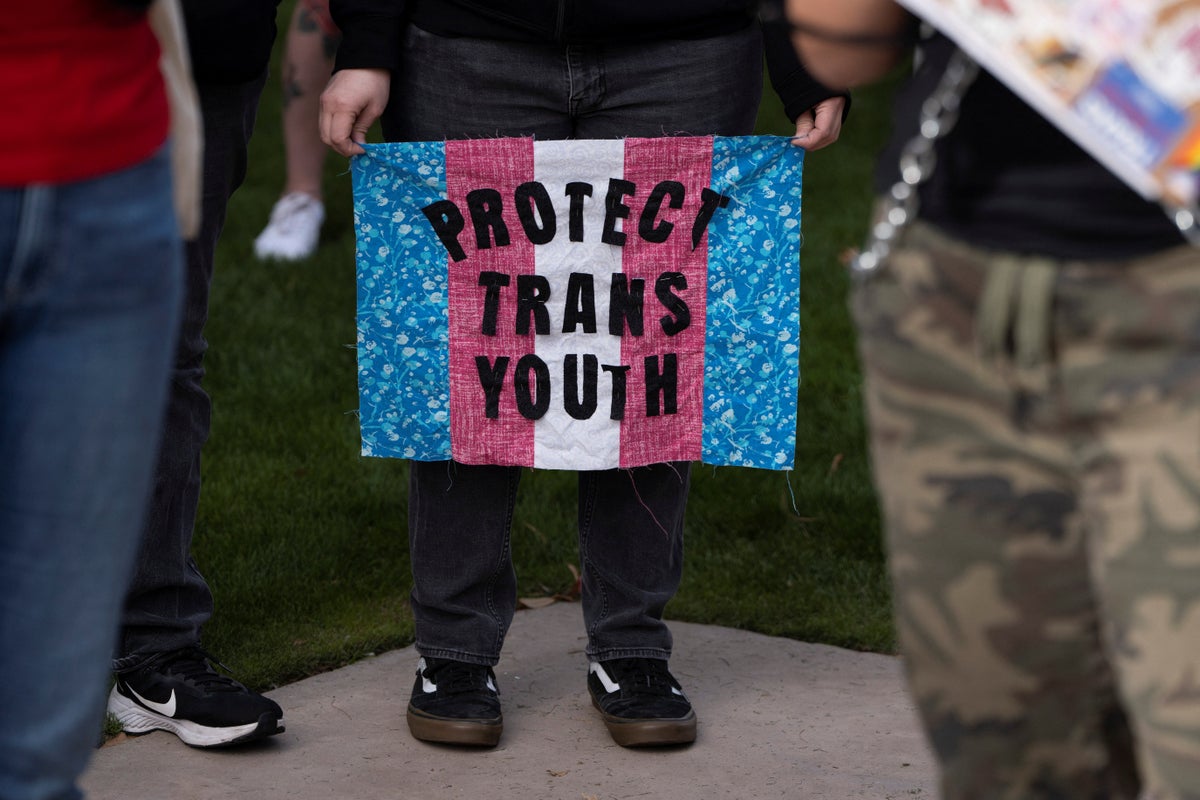
Libby Gonzales says she has spent nearly half of her life “begging” for her state’s elected officials to see her.
“It feels like my legislators want everyone to believe that kids like me don’t exist,” according to the 12-year-old transgender student from Texas.
“I’m tired and scared,” she told reporters during a briefing with the Human Rights Campaign on the scale of legislation across the US targeting LGBT+ Americans this year. “Every time I go to the Capitol I think, ‘Maybe this time it will make an impact.’”
More than 70 bills that could negatively impact LGBT+ people in Texas have already been filed within the first weeks of 2023, according to Equality Texas. Those bills join more than 300 similar pieces of legislation in state capitols across the US, following an explosive, unprecedented year of state-level measures fuelled by influential conservative Christian legal groups and a “parental rights” agenda dominating Republican campaigns.
At least 150 bills in 2023 would specifically restrict the rights of trans people, according to the Human Rights Campaign.
“The people leading our government should want every kid to have a great childhood,” Libby said. “Instead they’re the biggest bullies.”
Kelly Carter Merrill, the mother of a 14-year old transgender boy living in Hanover County, Virginia, told reporters on 14 February that a “minority of anti-trans extremists in our community feel emboldened by the national rhetoric to bring vile and often violent rhetoric” to local school board meetings.
“All we want is for our child to be treated with dignity and respect at school,” she said.
With a Republican majority in the state House and Republican Governor Glenn Youngkin, Virginia state legislators have introduced two bills targeting transgender young people this year. One would require students in public schools to compete in sports under the gender they were assigned at birth and another would force schools to tell parents if a child asked to be called by a different name or pronoun, which could effectively forcibly “out” students to non-supporting families.
That wave of legislation and inflammatory political debates surrounding them has radically impacted the mental health of a majority of young trans and nonbinary people, according to polling from The Trevor Project and Morning Consult.
A vast majority of trans and nonbinary youth, 86 per cent, said debates and laws targeting LGBT+ people have negatively impacted their mental health, weighed down by “anger, sadness, stress, and fear,” with fear “most intensely felt” among trans and nonbinary young people, according to The Trevor Project.
“Every single day, trans youth are facing the threat of harassment, discrimination and violence, and that’s all made worse when some politicians and public figures are targeting them in the hopes of holding onto political power,” according to Olivia Hunt, policy director for the National Transgender Center for Equality.
A renewed effort to restrict or ban gender-affirming care
Within the last few years, Republican lawmakers have advanced a barrage of legislation that would heavily regulate or criminalise transgender young people, from the sports that they can play as themselves, what kinds of bathrooms that they can use, and what kind of medically recommended and potentially life-saving medical care they can receive.
This year is no exception; proposed legislation would ban young people from transitioning into their late 20s, eliminate access to any form of gender-affirming care for transgender minors and their families, and prohibit teachers from using pronouns that match their students’ genders, among other measures.
The measures have also reached the federal level in proposed House legislation and within Donald Trump’s campaign, pledging to “stop” gender-affirming care for young trans people as part of his wide-ranging set of proposals leveraging the federal government to target trans people.
Bills in Oklahoma and South Carolina would make it a felony to provide gender-affirming healthcare, including prescribed hormones, to trans people younger than 26 years old. Similar bills in Kansas and Mississippi would outlaw that care to people up to age 21, while bills across the US would restrict gender-affirming care for minors.
Arkansas was the first state to do so, in 2021. Five others have now restricted gender-affirming care for trans youth.
“It couldn’t be any more clear that this is about discrimination,” according to Cathryn Oakley, the Human Rights Campaign’s state legislative director. “This is about young folks being able to live healthy, full lives.”
Human Rights Campaign president Kelley Robinson says the “historically bad” wave of legislation is wasting “energy attacking so few and most vulnerable,” echoing remarks from Utah Governor Spencer Cox, who vetoed legislation in 2022 that would prohibit transgender women and girls from participating in women’s sports.
But he “turned right around” and signed a law in January to outlaw gender-affirming care for transgender children, Ms Robinson said.
Weeks later, South Dakota Governor Kristin Noem signed legislation on 13 February that also outlaws gender-affirming care for trans youth, becoming the sixth state to do so.
“This situation is terrifying, it’s scary and it’s harmful,” Ms Robinson said.
“So many of these bills aren’t about protecting our communities,” she added. “[They are] preventing parents from deciding what is best for their children’s health, and injecting politicians into medical decisions that should be up for medical professionals.”
Gender-affirming care can span several kinds of treatments, including puberty blockers, hormone therapy and social transitioning support. Care standards from the World Professional Association for Transgender Health and other leading medical groups do not recommend that affirming surgeries be performed on minors, and the American Medical Association, American Academy of Child and Adolescent Psychiatry, the American Academy of Pediatrics and the American Academy of Family Physicians, among others, have established clear clinical guidelines for treating young trans people.
But legislation restricting such care is supported and in many cases drafted by influential right-wing legal groups, conservative Christian organisations and fringe medical groups that have aligned with right-wing public officials to advance their agenda.
Among them are the Alliance for Defending Freedom, which has been at the centre of high-profile legal manoeuvres to criminalise LGBT+ people and abortion care, and the American College of Pediatricians. Both are characterised by the Southern Poverty Law Center as hate groups.
The American Academy of Pediatrics, meanwhile, is the nation’s largest professional association of pediatricians. The group recommends a “gender-affirming” and “nonjudgmental approach that helps children feel safe in a society that too often marginalizes or stigmatizes those seen as different.”
“The gender-affirming model strengthens family resiliency and takes the emphasis off heightened concerns over gender while allowing children the freedom to focus on academics, relationship-building and other typical developmental tasks,” according to the organisation.
Dr Stephen Rosenthal, medical director of the Child and Adolescent Gender Center at the University of California San Francisco, told reporters on 14 February that “there is a lot of misinformation that seems to be the basis of targets towards providers, and that’s another extremely stressful and unpleasant aspect of all of this.”
“There’s a lot of effort that has to be made between medical providers and the public-interfacing aspect of our work, so that we can make sure that we’re able to continue to provide the resources and to do it in a way so that these resources are accessible to those that need them,” he added.
“The people coming for LGBT rights are the same people coming for reproductive rights, for voting rights,” Ms Robinson said. “They don’t want to just set back the progress of the last 40 years, but the progress of the last 400.”
The revival of ‘Don’t Say Gay’ bills
Following Florida’s passage of the Parental Rights in Education Act, which opponents have called the “Don’t Say Gay or Trans” law, 38 similar measures have been proposed in 20 states, including 26 measures in 14 states in their current legislative sessions alone.
The Florida law, which bars classroom instruction of sexual orientation and gender identity in lower grade levels or any others where it is not deemed “age appropriate,” has had a chilling effect among teachers and in classrooms, drawing questions and fears of retaliation and litigation over how to address questions or comments from LGBT+ students about themselves or their families.
Eleven bills inspired by that law would outlaw instruction on sexual orientation and gender identity altogether, according to an analysis from PEN America.
Similar measures have reached the federal level. One proposal supported by more than 30 House Republicans was swiftly condemned by LGBT+ advocates as a deliberately broad attempt to restrict classroom discussion of LGBT+ people and events while unjustly conflating LGBT+ people with sex and child abuse.
Another measure promoted by several House Republicans claims to “end the sexualization of children in schools,” language that critics fear would be used to ban books that include LGBT+ characters or history.
At least 27 bills in 13 states could remove long-existing obscenity exemptions to school and library staff that has allowed public education about anatomy, sex education and art, among other topics, according to PEN America. And another 15 bills in seven states could broadly ban books with “profane language” or “depictions of gender identity” altogether.
“These policies that are coming to Florida today will be in Texas tomorrow, will be in Arizona next week, and will be in Tennessee the week after,” according to Florida state Sen Shevrin Jones, the first LGBT+ Black person elected to the state legislature, who emerged as a prominent opponent of the state’s so-called “Don’t Say Gay” measure.
For Libby, the latest wave of legislation and policies threatening her healthcare has made her worried that she will have to leave her home state. Her younger brother and sister have nightmares, fearing that they’ll lose their family, she said.
“I’m just a kid. I’m sick of begging for permission to simply be me,” Libby said. “I just want my lawmakers to get out of my way and let me be who I am.”
If you are based in the US and seek LGBT+ affirming mental health support, resources are available from Trans Lifeline (877-565-8860) and the LGBT Hotline (888-843-4564), as well as The Trevor Project (866-488-7386 or text START to 678-678).
If you are experiencing feelings of distress, or are struggling to cope, you can speak to the Samaritans, in confidence, on 116 123 (UK and ROI), email jo@samaritans.org, or visit the Samaritans website to find details of your nearest branch.
If you are based in the US, and you or someone you know needs mental health assistance right now, call or text the 988 Suicide & Crisis Lifeline at 988. This is a free, confidential crisis hotline that is available to everyone 24 hours a day, seven days a week.
If you are in another country, you can go to www.befrienders.org to find a helpline near you.







